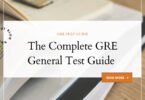The GRE Verbal Reasoning section measures your ability to analyze written material, understand relationships between words and concepts, and synthesize information. For many test-takers, especially non-native English speakers, this can be the most challenging part of the exam. However, with targeted strategies and consistent practice, you can significantly improve your score. Let’s break down the question types and how to approach them like an expert.
Overview of GRE Verbal Reasoning
- Structure: 2 sections, ~27 questions total, ~41 minutes total.
- Skills Tested: Critical reading, analysis of arguments, vocabulary in context, understanding sentence structure and meaning.
- Question Types:
- Reading Comprehension (RC)
- Text Completion (TC)
- Sentence Equivalence (SE)
Reading Comprehension (RC)
RC questions require you to read passages (ranging from one paragraph to several) and answer questions based on the information presented. Passages cover topics in sciences, social sciences, humanities, and everyday life.
Common Question Types: Main Idea/Primary Purpose, Specific Detail, Inference, Application, Vocabulary-in-Context, Tone/Attitude, Structure/Organization, Strengthen/Weaken.
RC Strategies:
- Active Reading: Engage with the text, identify paragraph points, note transitions, understand purpose.
- Focus on Structure: Analyze how the argument is built (compare/contrast, problem/solution, etc.).
- Paraphrase, Don’t Memorize: Understand core meaning, put key ideas in your own words.
- Address the Question: Read the question carefully before looking at choices.
- Use Process of Elimination: Rule out choices contradicted by the passage, irrelevant, too broad/narrow.
- Refer Back to the Passage: Find direct textual support for your answers.
- Manage Time: Don’t get bogged down; guess and move on if necessary.
Struggling with dense passages or tricky inference questions? Hone your critical reading skills with targeted practice on realistic passages in our GRE Verbal Reasoning practice tests!
Text Completion (TC)
TC questions present a short passage (1-5 sentences) with one, two, or three blanks. You must select word choices for each blank to create a completed text that is logically and grammatically coherent. Get all blanks correct for credit.
TC Strategies:
- Read the Entire Passage First: Understand overall context.
- Identify Keywords and Punctuation: Look for signal words (e.g.,
although,because) indicating relationships. - Predict Your Own Word: Think of a suitable word before looking at options.
- Address Blanks Strategically: Start with the easiest blank first.
- Check Your Choices: Reread the completed passage to ensure it makes sense.
- Vocabulary Matters: Understand words in context, including nuances.
Sentence Equivalence (SE)
SE questions present a single sentence with one blank. You must choose two words from six options that produce sentences with approximately the same meaning when inserted.
SE Strategies:
- Understand the Sentence: Grasp the overall meaning and the blank’s role.
- Look for Context Clues: Identify keywords suggesting the needed word type.
- Predict the Meaning: Think about the meaning required for the blank.
- Identify Potential Pairs: Look for roughly synonymous pairs among options.
- Test Pairs in Context: Crucially, ensure both words create meaningful sentences with the same essential idea within the sentence’s specific context.
- Process of Elimination: Eliminate words that clearly don’t fit.
Vocabulary holding you back on TC and SE? While building vocabulary takes time, you can test your ability to use context clues effectively in our challenging Verbal practice sets.
Verbal Reasoning Practice Tests:
- Reading Comprehension Practice Test
- Text Completion Practice Test
- Sentence Equivalence Practice Test
Building Your GRE Vocabulary
A strong vocabulary is vital.
- Learn Words in Context: Read challenging materials widely.
- Use Flashcards Effectively: Include definitions, synonyms, antonyms, example sentences.
- Focus on Word Parts: Learn roots, prefixes, suffixes.
- Practice Consistently: Integrate vocabulary study daily.
Key Takeaways
- Three Question Types: Master Reading Comprehension (RC), Text Completion (TC), and Sentence Equivalence (SE).
- RC Strategy: Focus on active reading, understanding structure, using process of elimination, and referring back to the passage.
- TC/SE Strategy: Understand context, identify keywords/clues, predict answers, and test choices carefully (especially SE pairs).
- Vocabulary is Crucial: Learn words actively and in context.
- Practice is Key: Use official materials and targeted drills.
Conclusion
Mastering GRE Verbal Reasoning requires a blend of critical reading, strategic problem-solving, and vocabulary knowledge. Focus on understanding the logic, practice actively, and learn words in context. Consistent practice, especially with official materials and realistic simulations, is your best path forward.
You might also find helpful: Start Your GRE Prep (2025): Read the Complete Guide.



